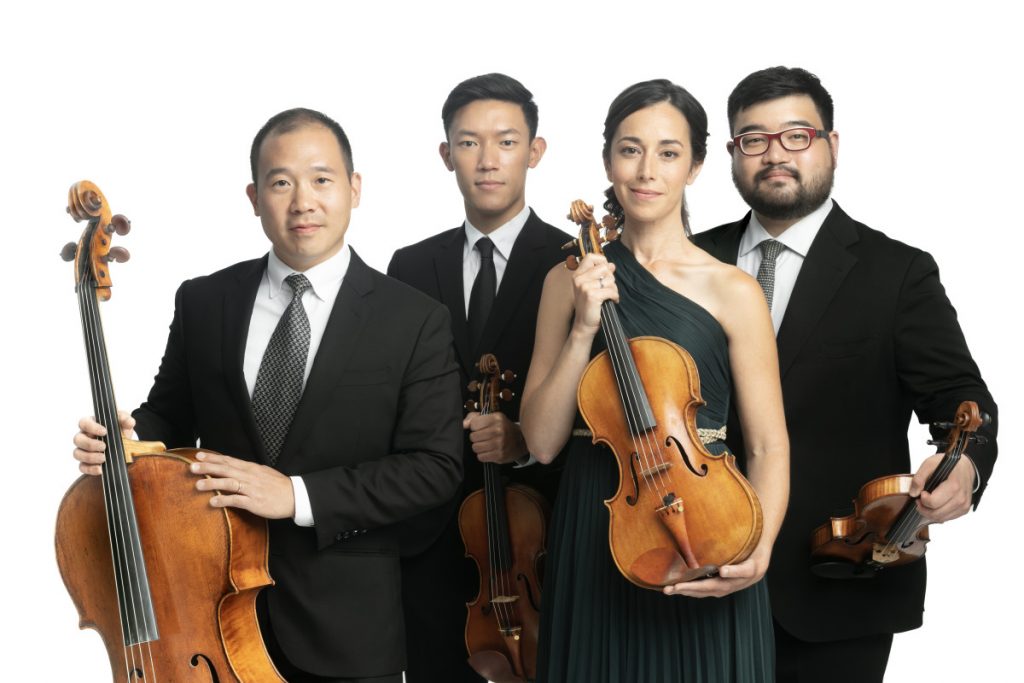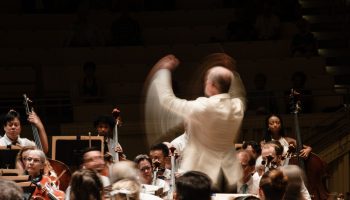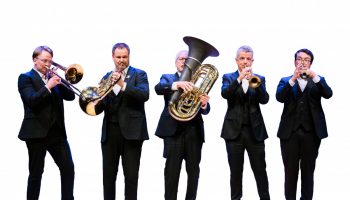
Gabriel Weber
Staff Writer
Grammy Award-winning Parker Quartet returns to Chautauqua — after an absence of about 10 years — to present a range of exploratory works in the summer’s final recital in the Chautauqua Chamber Music Guest Artist Series.
At 4 p.m. today in Elizabeth S. Lenna Hall, Parker Quartet will play John Adams’ “Fellow Traveler,” Franz Schubert’s String Quartet No. 13 in A Minor (“Rosamunde”) and Maurice Ravel’s String Quartet in F Major, M. 35.
Violinists Ken Hamao and Daniel Chong, violist Jessica Bodner and cellist Kee-Hyun Kim program with the audience in mind, finding something for everyone with a mix of traditional and fresh works.
“These are pieces that we’ve all been playing for a while, and we thought that in combination, that they would just sort of go well together. They’re all stylistically very different,” Kim said. “We thought, as a combination, people would like it, and it would provide enough contrast for a little bit of something for everybody.”
Adams’ work, “Fellow Traveler,” was composed for his longtime collaborator Peter Sellars’ 50th birthday. While the Adams’ piece is quite short, there is no moment of rest; he quickly cycles through different groupings of notes and meters.
“Adams is representing the 21st century; it’s short, bright, positive and very propulsive. It feels very American, somehow very fresh and new and exploratory,” Kim said. “To start a program like that, with that sort of intensity of focus, is a little bit difficult. It’s a lot of fun, very exciting and sort of visceral in that way. To execute it requires a lot of focus and precision.”
Schubert wrote “Rosamunde” at 26 years old; it was the only string quartet performed and published in his lifetime, as he died at 31 years of age. He frequently borrowed melodies from other music and used an entr’acte from the play Rosamunde for this work.
“The Schubert, obviously, is a classic. It’s one of the famous Schubert quartets and extremely lyrical,” Kim said. “It’s sort of minimalist and personal and intimate and a very, very heartwarming, beautiful piece.”
The Schubert and Ravel works are difficult in a similar way, in that the musicians want to bring fresh life to the pieces each time by reacting to each other and creating a sense of beauty. When Ravel first released String Quartet in F Major, the esteemed Paris Conservatory expelled him for the second time, but the public was avid in their embracing of the quartet. The work is notable for its rhythm structures that are complex and innovative, with swiftly changing dynamics.
“The Ravel, for some reason, reminds me of summer,” Kim said. “It’s very evocative and nostalgic, full of sentiment, longing and mysticism.”
The combination of music, camaraderie and rigorous exploration brought Parker Quartet together initially. Having met as undergraduates at the New England Conservatory in 2002, three of the musicians are founding members — with Chong and Bodner married — and Hamao joined in 2018 as a very natural fit, Kim said.
“We were friends and colleagues; we started in the spirit of fun. What’s better than playing music together with friends? And so it quickly became very serious. All throughout our studies, it evolved into something much more focused and intentional, where we just wanted to pursue it as a career path in being a professional string quartet,” Kim said. “We live very close to each other, we carpool and we work together. So there is a real sense of friendship and just deep-seated understanding and respect for each other — it’s a very fulfilling existence.”
Approaching their 23rd year as an ensemble, Parker Quartet is led by the spirit of connection and curiosity, prioritizing consistent refinement through space for dialogue. The musicians aim to find connections between new and old works when performing to see where the pieces’ values overlap and deepen understanding.
“Remaining curious, on a larger level, refers to our curiosity toward music of today. We play a lot of old music — Mozart, Beethoven and Schubert and that kind of stuff; that’s our foundation and our bedrock of the repertoire. But we also really enjoy music from the 20th century and music being written today. We’re curious about exploring different languages and traditions, and so we commission composers,” Kim said. “Having played most of the standard core repertoire, now it’s about finding the role of that repertoire in the context of music history. Finding even deeper levels of beauty and meaning, and then relating to music of today — that really keeps us stimulated and curious.”
The Parker Quartet also serve as educators and currently as Blodgett Artists-in-Residence at Harvard University. In their chamber music performance course, they teach 45 to 55 students, dividing them into various groups, and having the groups focus on one specific piece for a semester.
“To communicate our love for music, the message that the music itself possesses and sharing it with others is really at the core of what we do,” Kim said. “We joke that we’re creating the next generation of musical donors and advocates. They say about art, it opens your eyes and perspectives, giving you a much deeper, much more nuanced interpretation of the world. With chamber music, and with how intimate that relationship is between us and the creation of the music, I think the string quartet is actually in a unique position to pass on these values to the next generation.”
Kim began cello at 6 years old while growing up in New Jersey. Always following his sister, he attended Julliard Pre-College where she played piano. There, Kim was exposed to Yo-Yo Ma’s legendary musicality.
“As a young Asian boy growing up, Yo-Yo was this incredible role model. That’s what really drew me in — the sound. Especially with how communicative and expressive Yo-Yo is with the audience and how generous he is, I feel like that really struck a chord within me, and it wasn’t any other instrument. I really wanted to just play the cello,” Kim said. “This is a human voice, capable of such expressivity and vulnerability.”




